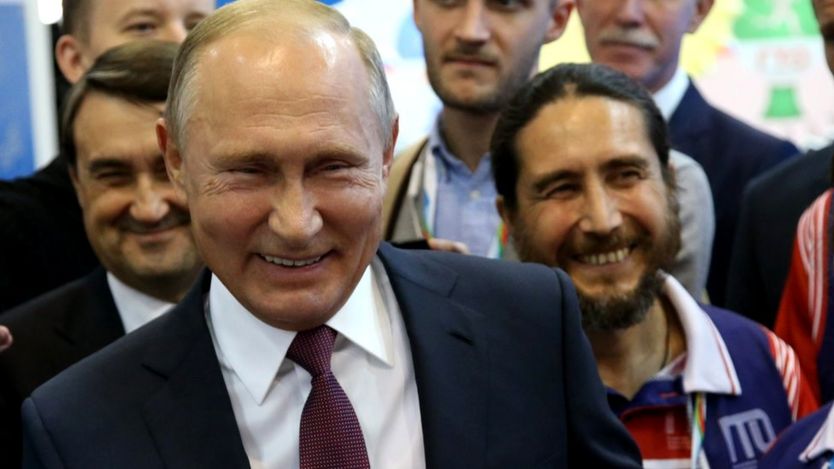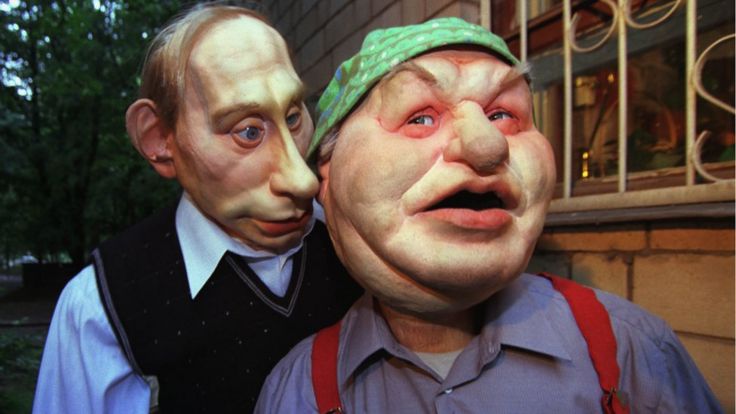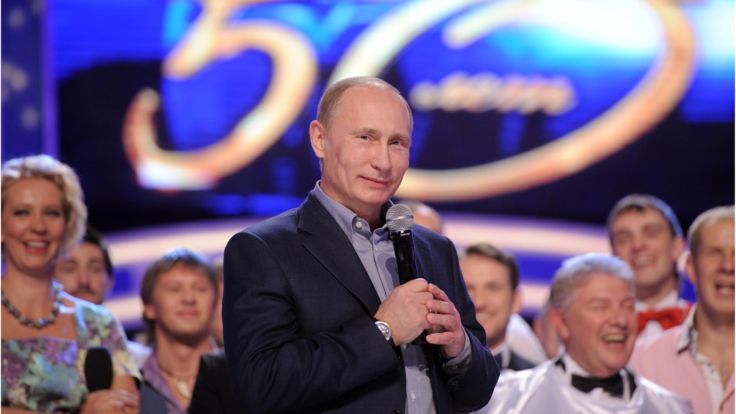-
15 December 2018
В России 21-ого века, подобно сталинскому СССР, объектами сатиры и юмора в средствах массовой информации являются Запад и его Лидеры, а Глава Государства и его окружение - никогда
Декабрь 2018
Опубликовано 2018-12-15 11:00
Опубликовано 2018-12-15 11:00
Сатира и Юмор в Путинской Федерации никогда не направлены на Путина и его окружение, а только на Запад и его Лидеров. Что резко контрастирует с ситуацией в Хрущевском и Брежневском СССР, когда анекдоты о советских вождях и положении в стране являлись частью фольклора. Анекдоты о самом себе Брежнев (по достоверным источникам) любил слушать и с удовольствием смеялся над ними.
Тем более это относится к времени Перестройки Горбачева, когда критика власти, с каждым годом все более сатирическая, стала частью телепрограмм и советских газет. При Ельцине самой популярной программой на телевидении были Куклы, в которых Президент Федерации высмеивался самым жестоким образом. Ничего подобного в Федерации Путина не может происходить. На телевидении и в газетах Путин изображается героем единоборств, человеком мощного интеллекта, который обводит вокруг пальца глупых и слабых лидеров Европы и США. Именно так описывалось и показывалось народу появление Путина на встрече двадцатки, где с ним никто не хотел говорить за исключением Принца Саудовской Аравии, с которым после варварского убийства по его приказу оппозиционного журналиста в посольстве Саудовской Аравии тоже никто из лидеров двадцатки не хотел говорить за единственным исключением Путина. Эти два лидера сразу друг к другу ринулись и чуть ли не лобызались. На Российском же телевидении Путин в "Большой Двадцатке" показывался как умный герой, в то время как на деле являлся презренным изгоем.
Возвращение сталинского использования сатиры и юмора в Путинской Федерации является одним из самых грозных и очевидных симптомов возвращения сталинизма.
How Putin's Russia turned humour into a weapon
 Image copyrightGETTY IMAGES
Image copyrightGETTY IMAGES
In the dying days of the Soviet Union, Russians used humour to escape the bleak reality of economic stagnation, food shortages and long queues.
Political satire flourished on TV in the form of latex puppets during the 1990s, but it was quickly slapped down when Vladimir Putin came to power.
In today's Russia, where the media is largely controlled by the Kremlin and its allies, there is little room for genuine political humour unless it is used to deflect the blame from the government.
How Russia turns criticism into a joke
Humour and ridicule were a key part of Moscow's response when the UK said it was "highly likely" that Russia was behind the poisoning of former spy Sergei Skripal and his daughter, Yulia, in Salisbury.
Russian officials and media figures have since tried to turn the English phrase "highly likely" into a mocking catchphrase that implies Russia is being blamed for everything with the flimsiest of evidence.
They have enlisted a range of popular figures from English literature, such as Agatha Christie's Hercule Poirot and Conan Doyle's Sherlock Holmes, to ridicule British allegations of Russian involvement in the poisoning which they denounce as unfounded.

Roman Dobrokhotov, whose investigative website The Insider was involved in exposing one of the two poisoning suspects, Anatoliy Chepiga, says such mockery is a form of trolling designed to "deliberately lower the level of discussion".
How the strategy works
"They cannot respond in a serious fashion and to the point, so they start to play-act. This is an attempt to mock, to reduce everything to nothing," Mr Dobrokhotov told the BBC.
Along with conspiracy theories and misleading narratives, he argues, this kind of tactic aims to sow doubt.
The result is that many will watch TV and decide there is no way of really getting to the bottom of what happened. In other words, he says: "no-one is a saint, truth does not exist".
Internet audiences are also a key target for this technique.
One social media hashtag - #IamFromGRUToo (#ЯтожеИзГРУ in Russian) - appeared to be inspired by the #MeToo movement. Pro-Kremlin Twitter-users mocked UK allegations against Russia's GRU (now GU) military intelligence agency.
One spoof job advert joked that the GRU was "looking for employees for its cyber-attack department, chemical weapons department and election-meddling unit. There is no need to apply - we will find you ourselves".
Ben Nimmo, an Atlantic Council researcher on Russian disinformation, told the BBC that attempts to create funny memes were part of the strategy as "disinformation for the information age".
Why Putin is out of bounds
Russia's move towards using humour to influence its campaigns is a relatively recent phenomenon.
When Vladimir Putin came to power in 2000, one of the first casualties was popular TV satirical show Kukly (Puppets), which had repeatedly had a go at the new president.
 Image copyrightGETTY IMAGES
Image copyrightGETTY IMAGES
TV is the main source of information for most Russians and humour was gradually replaced with apolitical or sanitised jokes that carefully avoid criticising Mr Putin or his inner circle.
Most comedy programmes on Russian state television these days are anodyne affairs which either do not touch on political topics, or direct humour at the Kremlin's perceived enemies abroad.
If the president is mentioned, it is in flattering terms, while Western leaders and institutions are fair game.
Take Russia's top mass-appeal TV comedy show, KVN.
Last year, a skit on the G20 summit depicted Mr Putin as an athletic, skilful practitioner of judo who ran rings around his Western counterparts, who appeared ungainly and foolish.
 Image copyrightAFP
Image copyrightAFP
"They have brought the humour inside," says author Peter Pomerantsev who himself experienced the world of the Russian TV producer.
While humour was once a threat to their Soviet predecessors, the Kremlin has now turned it to their advantage.
"It's not a super-serious regime, they do things with a kind of smirk and sometimes just with a smile. It's a system that allows for a certain amount of humour, it's not po-faced all."
BBC Monitoring reports and analyses news from TV, radio, web and print media around the world. You can follow BBC Monitoring on Twitter and Facebook.
Читайте также:
То, что, по убеждению ведущих Российских Телеканалов, является Главными достижениями правления Путина, глядя из Америки и Европы является преступлением
то, что глядя и из кабинетов Кремля, и из Великорусского Сердца, является достижениями, за которые можно и пострадать, и не постоять за ценой, глядя из Америки и Европы основано на вопиющих нарушениях общечеловечных законов и установленного порядка. Такая вот относительность героизма и преступления, достижения и морального разложения. Которые в зависимости от того, откуда на них смотреть: из Европы или же из России – меняются местами.
Под адскими санкциями Россия может лишь выживать
«Из-за обожествления свободного рынка мы утратили даже самые простые виды производства»
Побег от России
Пока всем скопом не накрыло Нас тут – здоровых и калек. Бежим, покуда эти рыла Наш не возглавили побег.
Поразительное выступление Джохара Дудаева
в котором пророчески предсказывается война России с Украиной, дается точнейшая характеристика власти и народа России, и много чего еще!!
|
Оставлять комментарии могут только зарегистрированные пользователи. Войдите в систему используя свою учетную запись на сайте: |
||
 Geopolitical concepts*
Geopolitical concepts*